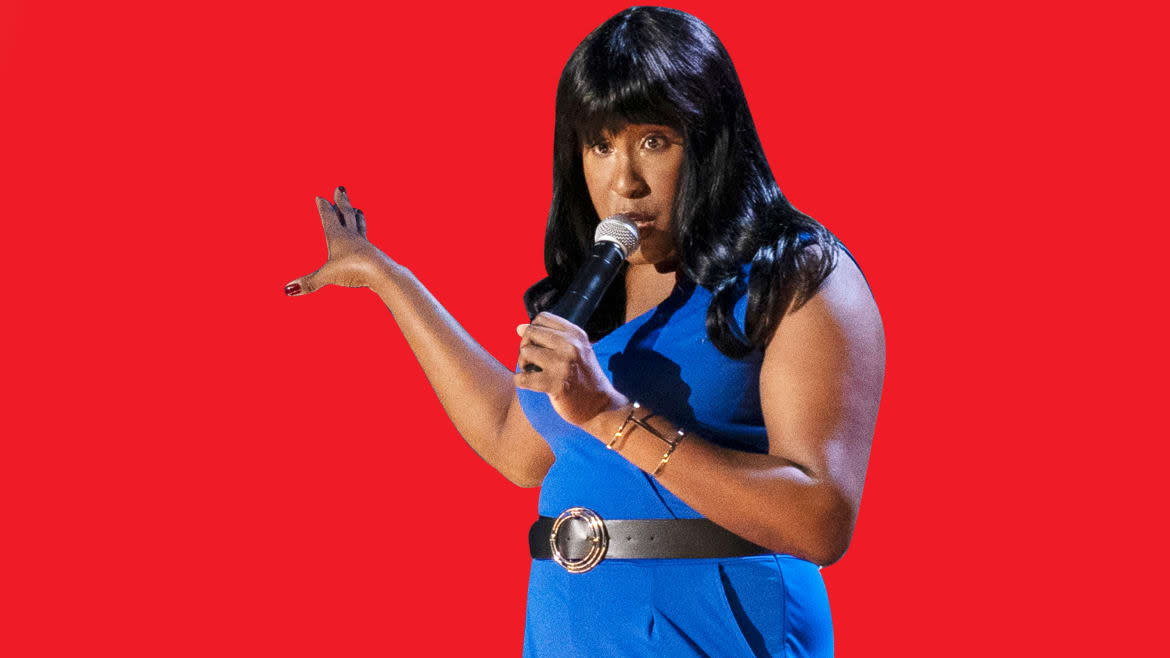Forget Chappelle—Naomi Ekperigin Is Netflix’s Most ‘Inclusive’ Comedian

- Oops!Something went wrong.Please try again later.
- Oops!Something went wrong.Please try again later.
- Oops!Something went wrong.Please try again later.
With a fiery new half-hour special as part of Netflix’s The Standups series, Naomi Ekperigin is more ready than ever to achieve that next level of comedy success. And she does it all while remaining far more “thoughtful” about how her jokes affect the audience than many of her closed-minded peers.
It’s been a long road, as she explains in this week’s episode of The Last Laugh podcast, from starting out as a writing assistant on Broad City to her current role as a writer and guest star on the final season of Search Party. We also talk about her risky decision to burn any potential bridge to Saturday Night Live by calling out the show for its lack of Black female cast members and why she felt “less excited” about being on Netflix after the Dave Chappelle controversy exploded.
“This feels right,” Ekperigin says when she first strides on stage in a bright blue romper to ecstatic cheers from the crowd in her new special. She tells me that in that moment she was trying to stay “present” while at the same time, “Everything around me is reminding me that yeah, this will live forever and be seen by so many more people.”
She landed the coveted spot as one of six up-and-coming stand-up comedians in season 3 of the Netflix series at a time during the ongoing pandemic when she was starting to wonder, “Will I ever do stand-up again? How long will it take before I’m good again?” After she accidentally says that she recorded the half-hour “this year,” she jokes, “I’m still writing 2021 on all my rapid tests.”
The Standups has served as a game-changing opportunity for comedians (and previous Last Laugh guests) like Nate Bargatze and Beth Stelling, exposing them to an enormous international audience and dramatically expanding their ability to sell tickets. “Initially I was like, are these jokes going to play to people who don’t live on the coasts, let alone in other countries?” Ekperigin says of her personal and specific material. “And then I just realized you go down such a rabbit hole with that thinking. It’s like, I don’t know how to play to Dubai. We’re just gonna have to hope.”
As a Black millennial from Harlem who aspires to be the star of her own Nancy Meyers movie and spends much of her act talking about her “Jewboo” husband and podcast co-host, Ekperigin has never quite fit the limited molds that are traditionally available for female comics.
“I’m not someone who puts a lot of stock in my looks, my physical appearance,” she tells me. “I’m not a ‘cute girl’ comedian. So I’m not going to play that game, whatever that game is. I’m not trying to be physically attractive to the audience. When I think about Nikki Glaser and Rachel Feinstein, women who are really beautiful and know it and carry that with them on stage—I was just never like that. I was like, I’ll put on a sensible pant.”
When I inform Ekperigin that Glaser told me on her episode of The Last Laugh that she would rather be “fuckable” than funny, she laughs and replies, “You know, hot opens way more doors than funny. Let’s be real.”
Keeping it real and honest is a big part of Ekperigin’s brand. But unlike the mostly male comedians who have launched some sort of crusade against political correctness, she is not above altering her material to avoid being “inadvertently” offensive. “If I’m trying to drag somebody, I’m going to drag,” she explains, but if that is not the goal, then she always tries to “put in an extra layer of thought” so as to not hurt anyone’s feelings unnecessarily.
For instance, she decided late in the game to add the word “most” to a bit about why she’s afraid of white men because “most white men were once white boys.”
“Just using the word ‘most’ was something for me where I was like, let’s be inclusive of people who may have transitioned in their lives,” Ekperigin says. “And it ain’t got to be a whole production, we ain’t telegraphing it, it’s not a bit about being trans, but I’m just accounting for an experience of a group of people.”
Bob Saget’s Legendary Roast Proved How Much Comedians Loved Him
It’s that “extra layer of thought” that is aggressively—and even deliberately—absent from the work of comedians like Dave Chappelle, who have become known for not caring if people are offended by their jokes.
For a moment, the uproar over Chappelle’s most recent Netflix special actually tainted Ekperigin’s feelings about showcasing her comedy there. “I was so excited about being on this platform and now I feel a little less excited,” she recalls. “Because you hate to be lumped in. But at the same time, you may be on the same platform with somebody but I’m still going to want to reach the biggest audience possible.”
Listen to the episode now and subscribe to ‘The Last Laugh’ on Apple Podcasts, Spotify, Google, Stitcher, Amazon Music, or wherever you get your podcasts and be the first to hear new episodes when they are released every Tuesday.
Get the Daily Beast's biggest scoops and scandals delivered right to your inbox. Sign up now.
Stay informed and gain unlimited access to the Daily Beast's unmatched reporting. Subscribe now.

